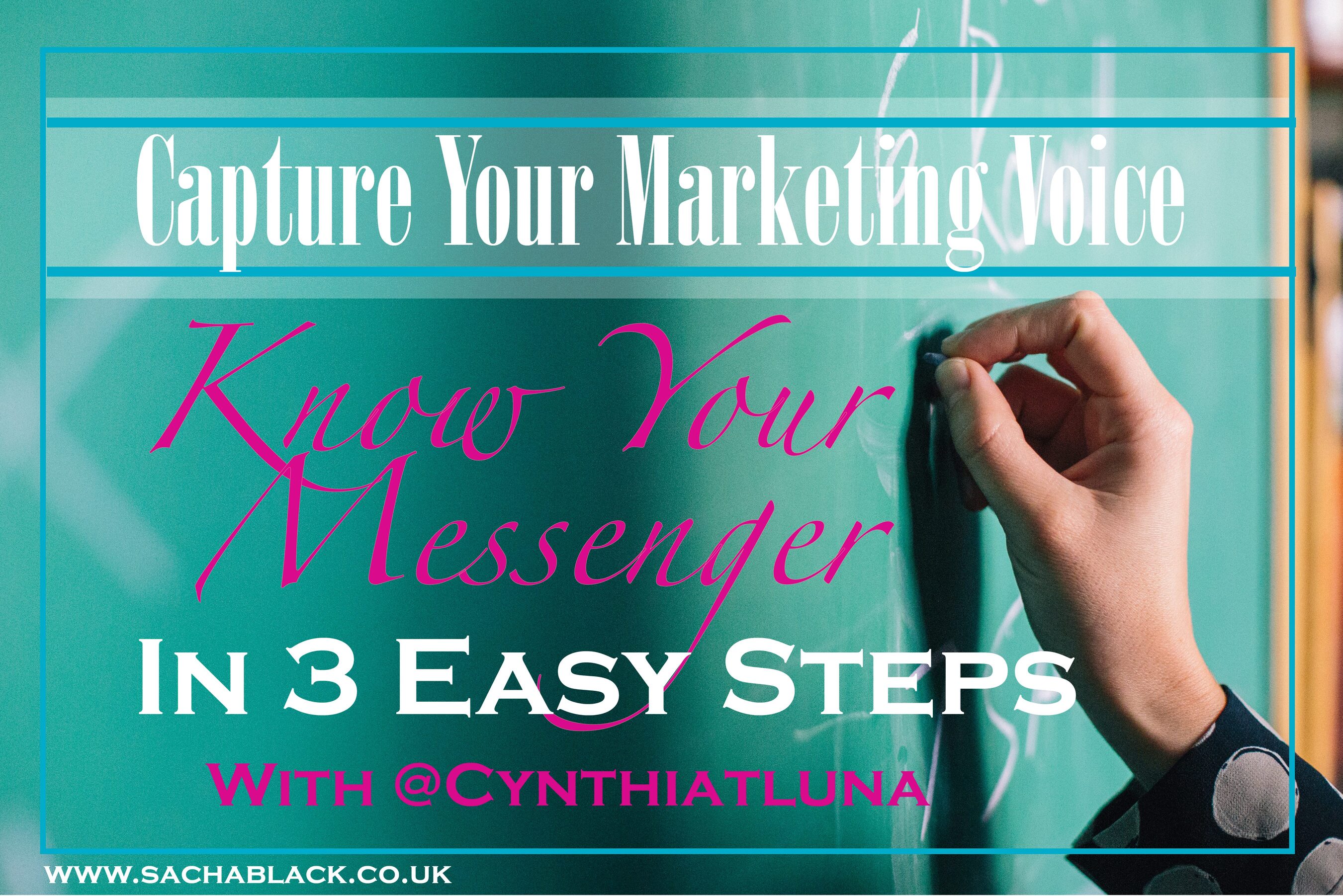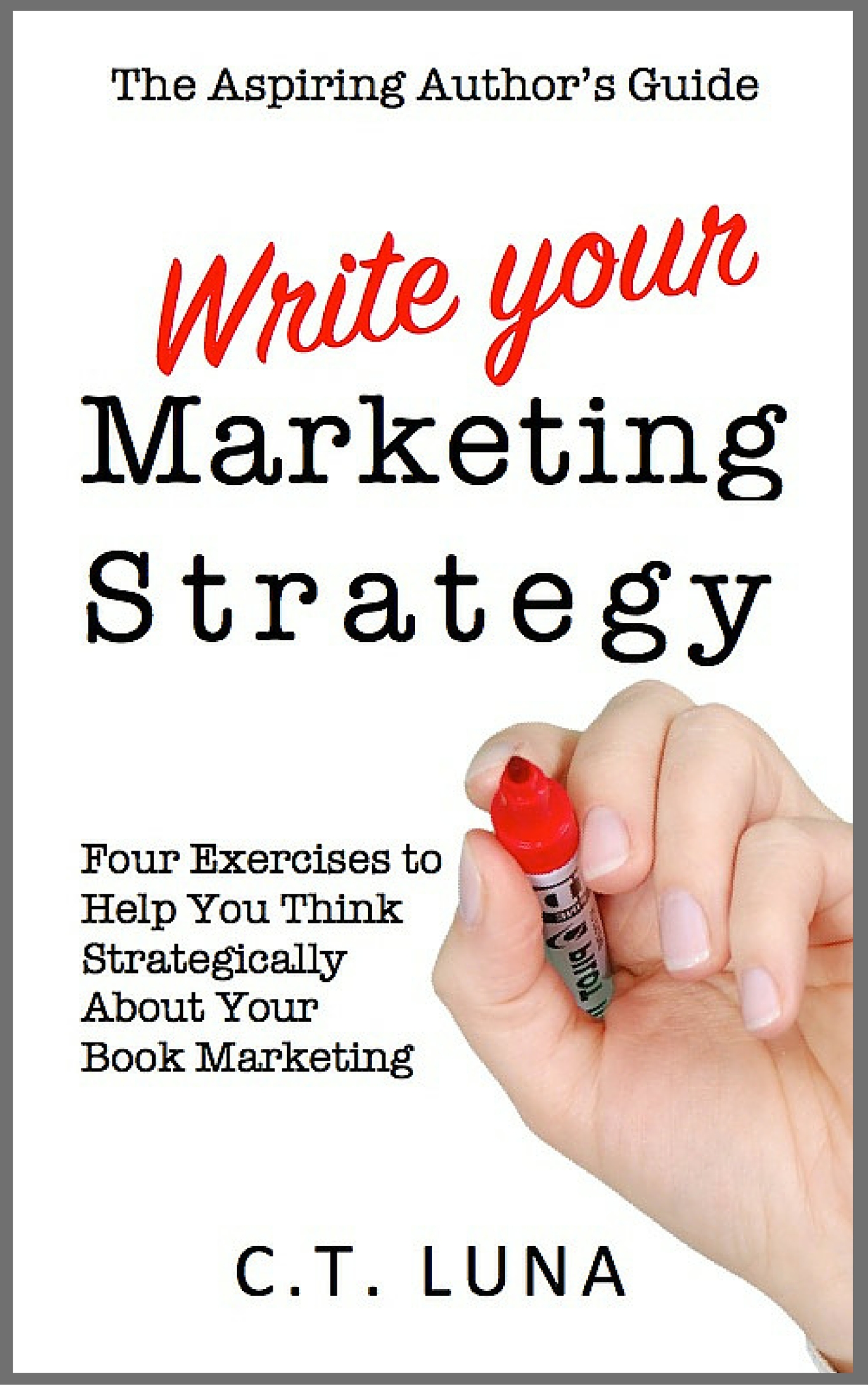 Today brings another guest post – This one is from marketing professional and bloggers bash attendee all the way from Switzerland, Cynthia T. Luna. Cynthia is the author of Write Your Marketing Strategy a fab marketing book which I had the pleasure of beta reading.
Today brings another guest post – This one is from marketing professional and bloggers bash attendee all the way from Switzerland, Cynthia T. Luna. Cynthia is the author of Write Your Marketing Strategy a fab marketing book which I had the pleasure of beta reading.
Cynthia is filling in for me today while I catch up from months of ignored admin having finished Keepers and even more ignoring of said admin as I am balls deep in my non-fiction book 13 Steps to Evil – An Writer’s Guide to Creating Better Villains.
So, Cynthia, you hero, thank you for coming, it’s an honour. This post is an excellent lesson for any author stuck on how what to say when marketing their book.
If you haven’t established a message beyond, “my book is great; buy it” or “you’ll love my book, I promise,” you’ll quickly find that you will run out of marketing steam nearly as soon as you began. That’s because you haven’t captured what I like to call “your marketing voice”.
You have certainly heard people advise for you to find “your voice”. It’s advice that is as valuable as “you’ll know when you know”–mysterious and non-specific. Thankfully, determining your “marketing voice” is less mysterious, more specific and it can be accomplished in a couple hours. I will share with you my process for capturing your marketing voice in three steps.

ONE – Define Your Readers to Find Your Readers
You have surely heard that when you’re ready to market your book (or any product) you need to go where your audience is. The American cookies and snacks manufacturer, Nabisco, pays good money to guarantee their biscuits are displayed on the eye-level shelves at grocery stores and gas (petrol) station convenience shops. Just as there is no sense in looking for “local, organic bananas” in Siberia, there’s no sense in looking for your readers in places where they are not likely to be–at least not in any significant numbers.
But before you search high and low for the perfect place to reach most of your readers, you need to know who your readers are.
Let’s say, for instance, you have written a book about website design. It is very possible that your readers shop at your local grocery store–website designer wannabes have to eat too!–but your book might enjoy more attention and success at a WordPress camp.
Maybe you’re writing a young adult novel, featuring teen werewolves, vampires and demons. So, your readers may be teenagers attending high school. But that’s not enough information for understanding who your readers are and how to come up with a marketing message (and campaign) that resonates with them.
If you remember high school the way I do, you’ll know that the wrong message, delivered by the wrong messenger at the wrong time will blow the chances of your book being picked up by a teenager–no matter how good a read it is. (Imagine how mortifying to have, say, your mother present your book during an English Lit–or worse, a Sex Ed–class would be. Epic fail.)
I harp on the topic of defining your readers as Sacha Black pointed out in her 9 Ways to Help You Find Your Readers blog post a few weeks ago, because understanding who your readers are helps you:
- Find your readers where they are. Once you understand who your readers are, you understand their habits and haunts, and can find them at the right place and the right time with your words, wit and wisdom.
- Identify the right messenger for delivering those messages. For authors this usually entails adopting the right tone. Quick tip: If you’re writing nonfiction, you probably want to come across as an authority on your subject matter; and if you’re writing fiction, you don’t want to condescend to your reader, no matter what your genre–even five year olds can detect a phony. (I expand on this in step two below.)
- Craft marketing messages that resonate with them and their needs and wants. These messages inform your book blurb, one-liners and taglines for your advertising copy, and even talking points you might have handy when the media come scrambling to you for your red carpet interview. (A writer can dream, right?)
- Craft non-marketing messages (because you know that “buy my book” gets tired after, like, the first time you’ve said it), such as blog posts and social media updates that keep the conversation going around your author brand and book’s themes.
TWO – Define Your Messenger: Give your marketing voice character
My process always begin with me, the creator of my work. And I start here, because this portion of the exercise establishes the reader within you that wanted you to write your work. Surely you have heard writers say, “I wrote the book I wanted to read.” Perhaps you are that writer. Well, that’s a wonderful start, because it means you have a good idea of the kind of reader you wanted to appeal to.
I start by drawing up a character file.
The first step is to describe yourself without mentioning your name. You’re a writer, so describing yourself shouldn’t be hard.
Let’s start with the basics: your “demographic information”. Because we’re talking about you here, you should know this information.
- Name of Subject: (leave this blank to start)
- Gender:
- Age:
- Main language (language your book is written in)
- Education, relevant experience or knowledge. Sometimes, this is that one sentence that makes it into your bio. “Rex Howler was raised by a pack of wolves for the first 5 years of his life until he was adopted by the two meanest parents on the planet. The last five, he chased this tale trying to track down his long-lost wolf brother and childhood best friend…”
- Nationality/ Cultural identity/ Religion. This is especially important if this is relevant to your book or the market it is being presented to. “After her divorce, Liz Gilbert packed it all in and traveled to Italy, India and Indonesia to find the only true love there is…”
- [Fill in the Blank]. Depending on the nature of the book you’re writing, you may have other qualifying categories, such as, “President of the Lady Loopers, Knitting and Crochet Membership Association” or “YouTube vlogger”.
Your job is to turn the Creator into a character that exhibits habits that make her believable, predictable and likeable.
Let’s pick up on the previous example of the Creator being the author of a book about website design. Start by writing a small paragraph (two or three sentences) on the Creator in third person:
- “The Creator wakes up to the smell of roasted beans percolating from her pre-programmed coffee machine. She drinks the dark java (black, of course) while perusing on her tablet the blog posts of her favorite interior designers. The inspiration for many of her own website designs have come from the creative ways other designers handle small spaces. By the time she moves on to her second cup, she is scanning her Twitter feed, where she finds out about official and unofficial WordPress Camp meets.”
The more closely you can relate this to the content of your book, the better. While this may seem clear for nonfiction, it should not be hard for fiction writers. One thing I like to do is imagine my “real life” as if it were set in the genre of my fiction.
Here are some examples. I don’t write in these genres and settings, but this is how I would describe the psychographic elements of the Creator:
- The Creator wakes up before sunrise every day. It’s the only way she can squeeze in a moment’s peace before stepping into the warzone that is the kitchen. She’s not an untidy person, but the warriors still slumbering under the glow-in-the-dark stars in their rooms have a different idea of civilized living.
From the above example, I can already glean some ideas of who the Creator of this book is. She’s a busy, time-strapped caretaker/mom of young children who snatches her “me time” before sunrise. Though we don’t have much detail on her book–it could be a story for rambunctious kids, or it could be a nonfiction work on organizing your kitchen–we have already established some characteristics of the Creator’s voice. Here’s another example:
- Once the Creator has had a slice of cold pizza for breakfast can he get started with his day. He’s no different than the hero of his story (in that he believes the world needs less homework and more adventure) except he might be a little bit older, a little less fit, and might still get his thrills from cracking the spine of a hardcover book rather than turning on an ereader.
In this example, the Creator is a bit more specific about the type of book he has written (fiction), and he is juxtaposing himself against the hero in his story. The reader would expect for this author to be approachable–like a history teacher or literature professor who made his curriculum interesting and exciting.
Some other questions you might feel are relevant for developing the psychographic profile of the Creator.
- Does the Creator have a day job she loves, hates, both? Why?
- How does she like to consume her information? On paper, in an e-reader?
- What kind of books does the Creator consistently turn to?
- What other writers/ authors/ bloggers does she turn to again and again?
- What social media does the creator “play” in when she’s not working?

THREE – Name Your Messenger: Give your marketing voice a name
Now, give your “Creator” a fictional name. Ideally, this is a code name that will help you remember some of the standout characteristics for the messenger of your marketing voice.
Drawing on the website designer example above, we might decide to give the name Website Wendy or Percolating Press. The code name does not have to include any reference to the Creator’s actual name. In fact, it’s probably better not to incorporate your actual name in this code name, because you really want to focus on the persona you have created.
Why is this exercise important for capturing your Marketing Voice?
Now that you have established a persona–a marketing messenger–for your marketing, you can begin to capture your marketing voice.
First, your messenger persona is your authenticity check when you’re developing marketing copy. (Does this sentence really sound like something my messenger would say?) Additionally, it can help you “get into character” or, better yet, understand your character’s role in communicating your marketing message.
Remember the example above where I mentioned your mother announcing your latest book to a high school sex-ed class? Now that you understand the role of your marketing messenger, you might find it easier to shed your real-life voice as a mother and don the costume of “Auntie Margaret,” the cool aunt who published a high school romance novel for young adult girls. Auntie Margaret, not having kids herself, might reconsider the thought of embarrassing her “niece” in a high school classroom, and might instead post Snapchat messages or organize a regular Twitter party (#AskAuntMags).
Knowing your marketing messenger is a great way to double-check whether the venue for your marketing copy is compatible with your messaging. Auntie Margaret knows that fewer and fewer young adult readers are spending any significant amount of time in Facebook–so she may shift her attention from Facebook to Instagram (owned by Facebook).
Percolating Press (or Website Wendy) might feel that guest posting on an online tea-lover’s magazine isn’t quite the right fit. But, as a drip-coffee lover, she might be in good company as a contributor to a slow-food lifestyles magazine.
Once you have captured the voice of your marketing messenger (the Creator), developing your messages and coming up with marketing tactics to deliver those messages becomes easier and more manageable. Goodbye “buy my book!” messaging, and hello to connecting with your readers!
Cynthia T. Luna is the author of The Aspiring Author’s Guide: Write Your Marketing Strategy and aspiring author of two fictional works in progress. She blogs about writing, the writing process, marketing for writers, and integrating the writer’s life with her style of living at www.LivinginCyn.com from her home in Winterthur, Switzerland. Sign up to receive monthly email updates on her activities or follow her on Twitter @CynthiaTLuna.

Thank you, great advice on how to find your marketing voice. I`m looking forward to building the character and seeing where it takes me.
Glad you liked Cynthia’s post she’s ahead of the game with years of actual marketing experience 🙂
Thanks for your kind words, Sacha! Every marketing campaign is new to me — I think that’s why I love it so much. There’s always something new to learn! (Amazon, though, whew! That’s a beast I need to understand… 🙂 )
Looking forward to hearing about your progress! Thanks for your comment!
I really love the idea of establishing a persona for one’s marketing voice. I think I’ll also experiment with this approach. Thanks for sharing your insight!
Glad you like it. I agree, it is a great way to think about it, lots of writers don’t like marketing and it’s almost a way to divorce yourself from it 🙂 thanks for stopping in
So glad you see the value in establishing a persona. I think novelists are so uniquely qualified to do this, and so few turn to this strength in promoting their work. 🙂 I checked out your page. Looking forward to following your work!
Reblogged this on Anita Dawes & Jaye Marie.
Thanks so much for sharing have a lovely weekend 🙂
You too, Sacha…
Thanks so much for sharing. P.S. I LOVE YOUR BLOG! (Sacha’s too, but yours is right up there.) Learn so much every time I visit… <3
Thanks for that, you have no idea how much this means to a blogger!
So interesting. And amazingly, a marketing exercise that actually sounds fun! I’m going to experiment too and see what comes up. 🙂 Thanks for the guest post, Sacha and Cynthia.
Your welcome, glad you liked the post 😀
I love this post! It’s a cool idea to have a ‘character’ to do your marketing. Makes it seem more like fiction and less like selling 😉
(and AW two of my favourite ladies in one place!)
I know right, it really is. Cynthia is full of amazing ideas and marketing know how 🙂
DING! You’re so the bomb! You do such great work in communicating your literary style, Icy! I love your blog posts! And, yes, having a character do your marketing takes the pressure off. It’s like having a celebrity on hand to endorse your work! 🙂 Looking forward to learning more from you!
Really good ideas here, thanks for sharing. 🙂
Such an honor, DGkaye! Thanks for your comment! <3
Thank you, <3
Sorry I entered the conversation so late in the game! I have been tucked in bed all weekend. *boo!* Thank you for a wonderful Sunday blog catch up!
Thank you for sharing. Invaluable advice.
Thanks so much
You are more than welcome. 🙂
I love the idea that my marketing voice is a character in and of itself. Perhaps if I start thinking of it as the same sort of fictional entity as the characters in my books it wouldn’t be quite so intimidating.
Couldn’t agree more! It takes responsibility away in a weird way
It won’t — well, unless you make your marketing voice embodies the character of a smarmy used car salesman. 😛 I look forward to hear your progress… 🙂
Thank you for sharing Sally, from Cynthia and me 😀
As usual, I’m late to the party but this is really good stuff. Thanks for sharing. I’ll be passing it on.
Thanks so much, Cynthia is a wealth of knowledge it was an honour having her here.
Please do! The more the merrier! <3
Thanks, Smorgasbord! When I saw your reblog a few days back, I couldn’t seem to get to your webpage! I’m following now and looking forward to your blog posts! And, thanks, too, for sharing!! 🙂
strange.. normally comes up but to be honest there are more things on heaven and earth that are more predictable than WordPress!!
Thanks for bringing Cynthia over to share her advice. Great stuff!
Thanks for reading NOrah 🙂 🙂